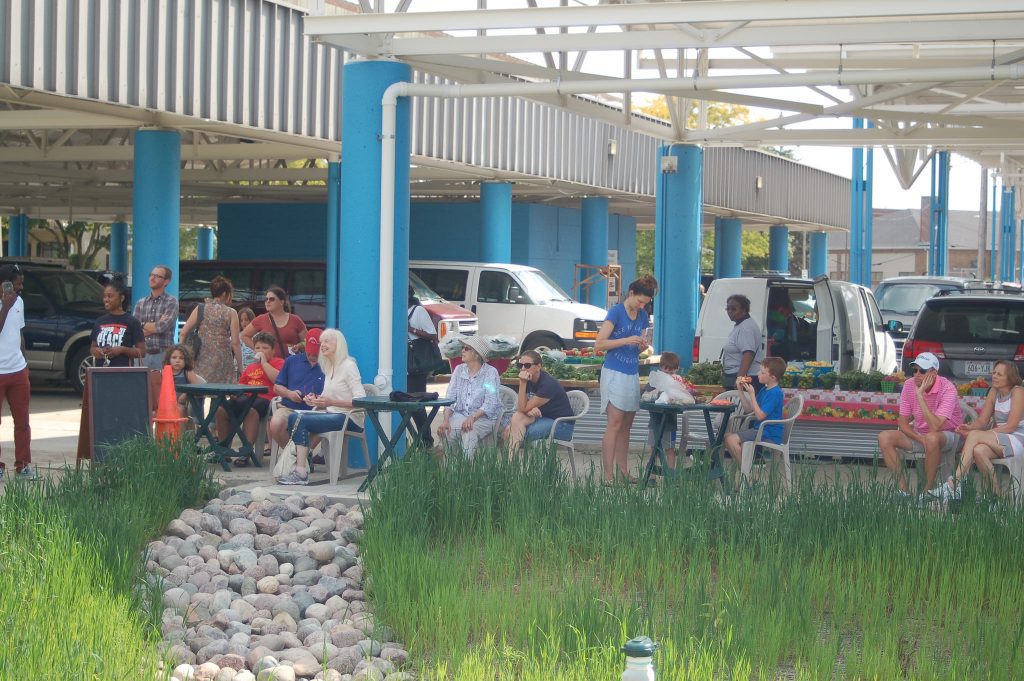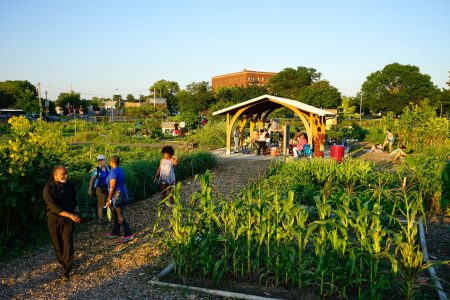Walnut Way Wins National Grant
For solar panels and green infrastructure in Lindsay Heights neighborhood.

Stones form part of the sustainable water management system in Fondy Park, which is 98 percent water permeable. Photo by Andrea Waxman.
A recent grant from the Institute for Sustainable Communities will provide Walnut Way Conservation Corp. with the funds to complete several solar energy projects in Lindsay Heights, in addition to three green infrastructure projects.
ISC selected Walnut Way through a competitive national application process. It is one of two community-based organizations that will join ISC’s Partnership for Resilient Communities this year. The other organization is in San Diego. The two will join communities in Baltimore, Detroit, Kansas City and Pittsburgh, which were selected in 2016 and 2017. The Partnership for Resilient Communities will provide Walnut Way with customized technical assistance, access to ISC’s large national network of sustainability and resilience practitioners, connections with peer organizations and $150,000 to expand and accelerate its work on energy and water resilience.
The grant period is 13-15 months, according to Steve Nicholas, ISC’s vice president of U.S. Programs. “We hope to find ways to extend the relationship” with Walnut Way, he said.
ISC’s mission is to help communities around the world “address environmental, economic, and social challenges to build a better future shaped and shared by all,” according to its website.
PRC is focused on helping organizations in marginalized urban communities build resilience, which it defines as “the ability of people, institutions and systems to manage economic, environmental and social shocks and stressors and build stronger more prosperous communities,” said Nicholas.
In addition to supporting environmental sustainability, the program seeks to promote inclusive community-driven approaches to advancing social equity and bolstering social cohesion within cities.

Photovoltaic solar panels that convert sunlight into electricity will be installed at Alice’s Garden with the help of the ISC grant. Photo by Adam Carr.
Though there is a surge of interest in urban resilience around the country, “a lot of it is top down and overly focused on physical resilience. There is not enough focus on economic and social resilience, clean energy communities and regional climate action,” Nicholas said.
Staff members from ISC’s Vermont headquarters, Walnut Way, the city’s Environmental Collaboration Office (ECO) and other partners and residents met recently for a two-day design session to discuss the projects in Lindsay Heights.
“The idea for solar was not hatched with the grant, (but it) is adding resources for projects already underway,” explained Jeremy Davis, Walnut Way environmental specialist.
Photovoltaic solar panels that convert sunlight into electricity will be installed at four neighborhood sites: Walnut Way, 2240 N. 17th St.; the Innovations and Wellness Commons, 1617 W. Fond du Lac Ave.; Fondy Farmers Market, 2200 W. Fond du Lac Ave.; and Alice’s Garden, 2136 N. 21st St.
Davis explained that Milwaukee uses a “net metering” system. When organizations produce electricity with PV panels they are “essentially providing We Energies with electricity.” Customers with PV panels get credits in exchange for what they produce and debits for what they use. The systems that Walnut Way plans to install will reduce users’ cost of electricity.
The green infrastructure projects include diverting more storm water from the Fondy Farmers Market’s 12,500-square foot roof into the Fondy Park water management system, Davis said. Last summer, local partners established the water-permeable Fondy Park on a vacant lot adjacent to the market.
The second infrastructure project will be to complete an underground water cistern at Alice’s Garden, Davis said. The plan is to use the solar system to power a pump to irrigate the gardens with harvested rainwater, as well as lighting and electrical outlets for evening activities in the garden.
In addition, the grant will help the Greater Galilee Missionary Baptist Church’s new community center to modify its landscape plans so that it can capture storm water, Davis said. The church is located at 2432 N. Teutonia Ave.
“This grant … will also help us to develop Walnut Way as an environmental tour destination” and work with the City of Milwaukee’s Environmental Collaboration Office to become a certified ECO neighborhood, said Erica Heisdorf Bisquerra, Walnut Way’s communication manager. With ECO, Walnut Way will design and install signage at selected sites and publish information to help residents and visitors tour the neighborhood assets and learn about community resilience, she added.
Making sure that neighborhood stakeholders are involved in installing environmental improvements in their communities, thus providing them with employment skills and jobs, is part of PRC’s vision, according to Nicholas. As part of its technical assistance and training, PRC hopes to help Walnut Way build the capacity of its year-round employment program, Blue Skies Landscaping, in which resident landscapers learn “innovative green installation (skills) that are reducing storm water pollution,” Heisdorf Bisquerra said.
He added that he would like to see Blue Skies get Milwaukee Metropolitan Sewerage District’s green infrastructure certification and also have residents observe the installation of solar PV panels “to get them skills in that field.”
“Our office is really excited about the leadership Walnut Way is showing, said Shambarger, whose office will also be working with Lindsay Heights on its recently unveiled ECO Neighborhoods initiative, a certification program and toolkit to help neighborhoods organize around environmental improvement.
Walnut Way may also be invited to ISC’s Sustainable Community Leadership Academy, a national peer-learning platform, which brings teams from 10-15 cities to work and learn together, Nicholas said.
Walnut Way was selected for the ISC grant because it has “demonstrated that it can do this work effectively,” said Nicholas, adding that it has many strong partners, including the city government, and does both sustainable energy and sustainable water management work. In addition, he said, ISC wants to work with marginalized communities such as Lindsay Heights.
“We’re a capacity-building organization. We want to help you strengthen your work,” said Nicholas at the design session. “We are not coming in to tell you what you need.”
Both Nicholas and Heisdorf Bisquerra expressed the hope that Walnut Way will be a model for future collaborative community–based environmental and workforce projects.
This story was originally published by Milwaukee Neighborhood News Service, where you can find other stories reporting on eighteen city neighborhoods in Milwaukee.




















